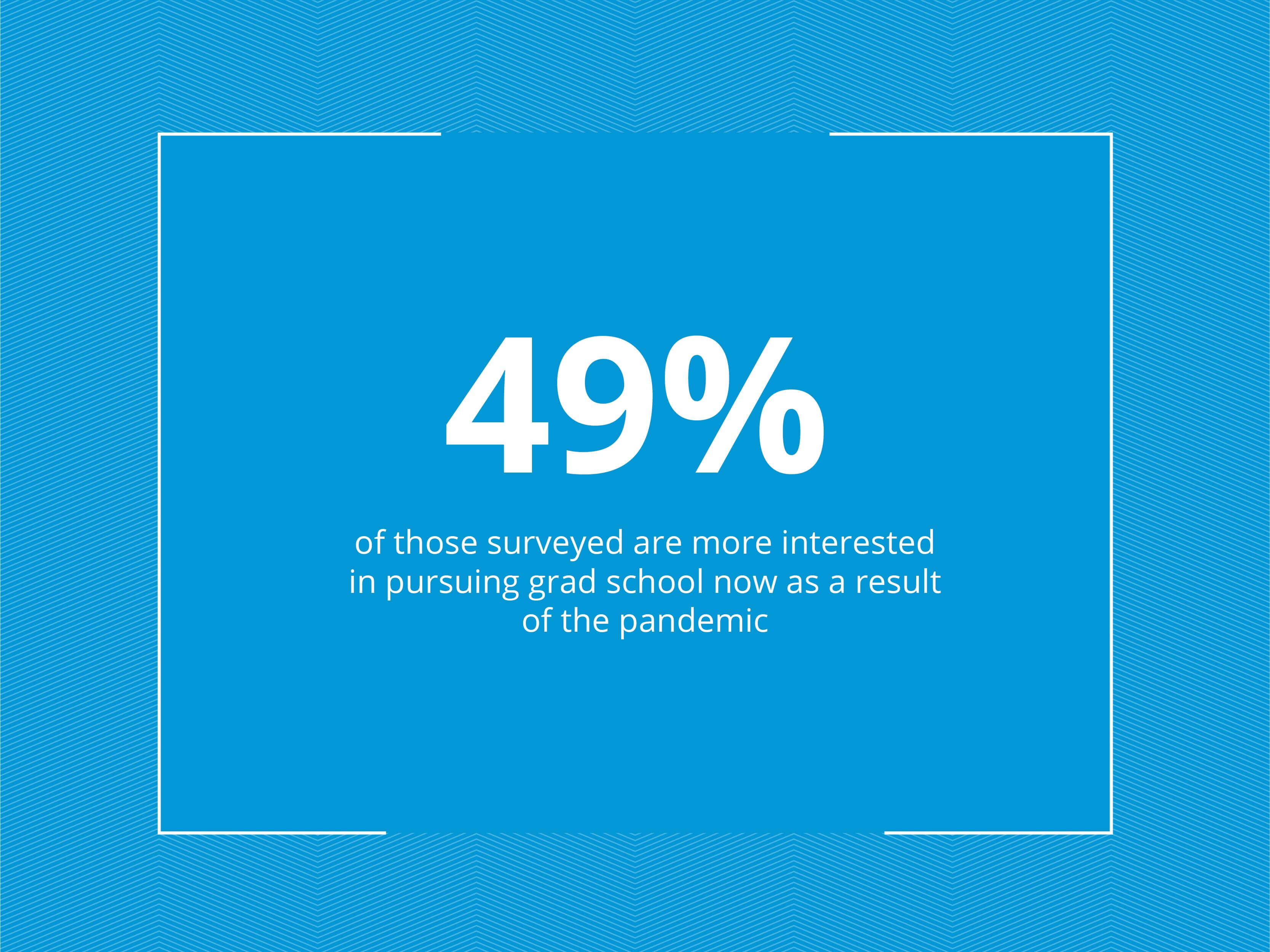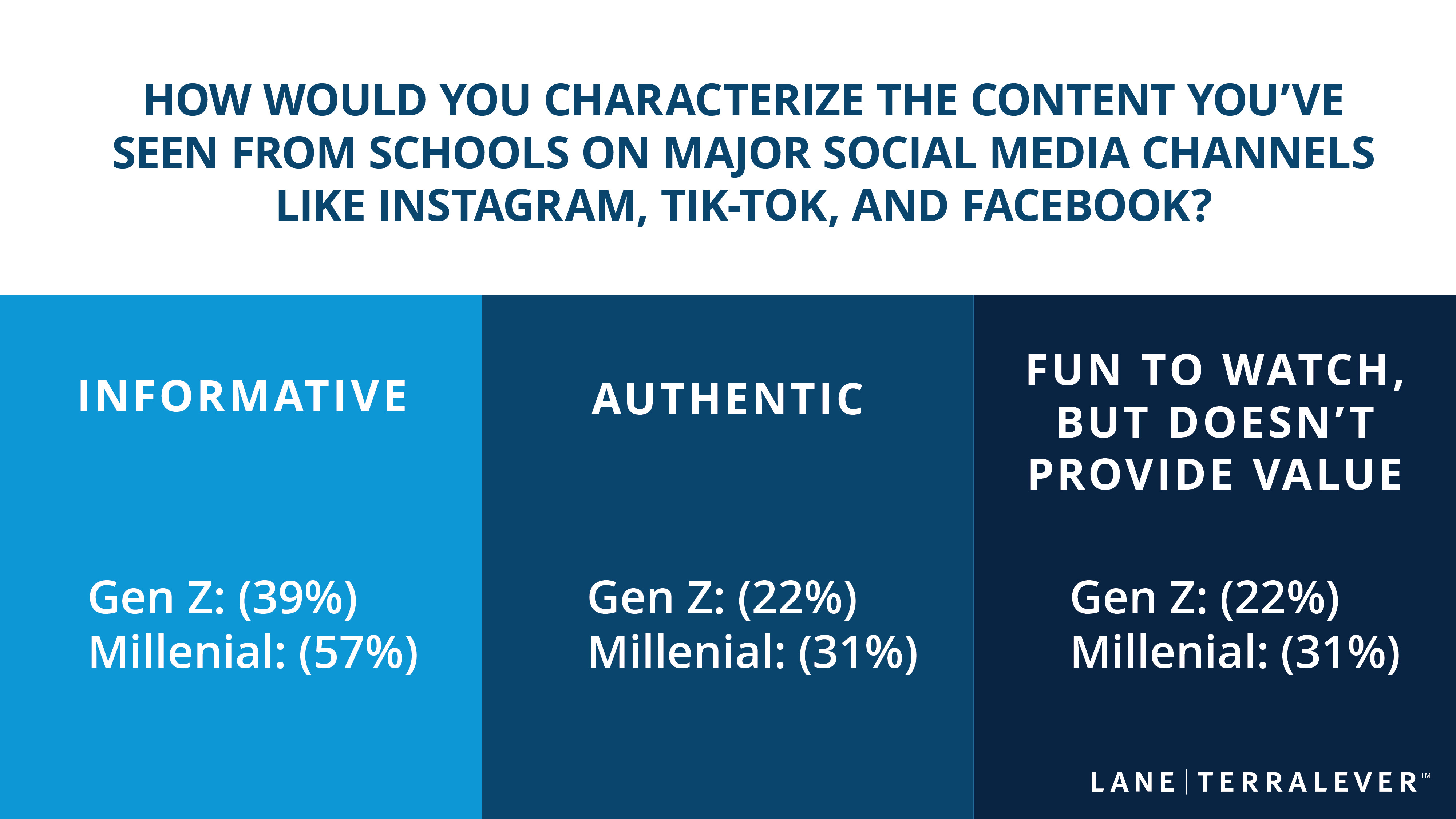Marketing to Graduate Students
The industry of higher education is going through a major shift. Collective attitudes toward colleges and universities, student loan debt, return on investment, and opportunities outside of traditional higher education are changing.
Looking specifically at graduate school, many are doubting the financial benefits of accruing debt for an advanced degree, but there are also many interested in going back to school. The potential students are there. The real question is: are you marketing to them the right way?
Marketing to graduate students isn’t the same as marketing to recent high school graduates entering college for the first time. Graduate student journeys have different pain points, barriers, needs, lifestyles, and ages. They come from unique backgrounds and want to use their graduate degree in a number of ways.
As a strategic partner and experienced higher education marketing agency, we wanted to learn more about these user journeys so we conducted a nationwide survey of 920 graduate students to learn more about what they want to see in graduate school marketing efforts.
Understanding Today’s Graduate Student
Before you can market to prospective graduate students, you first need to understand them. Higher education institutes have a great opportunity to hear what their target students want and deliver messaging that will resonate and lead to enrollment.
Based on student responses in the survey, we uncovered these insights and opportunities for graduate schools.
Preference for online & flexibility: We found that 80% of respondents prefer online or hybrid instruction, so some form of flexibility is desired. This makes sense as a large portion of graduate students are also working or raising a family while considering going back to school.
To address this, graduate schools need to market based on student lifestyle. Prospective graduate students should feel like school will fit into their lives and that their busy life will be respected and recognized.

Many questions aren’t being answered. Our direct, qualitative interviews shed light on the issue of communication between schools and prospective students. Many are finding the information they’re really looking for isn’t easy to find or readily available.
While the application process for post-graduate programs is intended to weed out the less committed students, it is still important for higher ed institutions to attract a large, quality group of applicants while setting clear expectations. Ensuring the right information is easy to reach is a major part of this process.
Graduate school is an emotional decision. Previously, we thought that applying and enrolling in graduate school was a very analytical decision. Turns out, the opposite is true. Feelings like pride, motivation, and inclusion rose up a lot in the survey data. Sixty percent of respondents said they would be the first in their family to complete a postgraduate degree.
To address this major finding, marketing for graduate programs needs to be genuine and authentic, versus the traditional practice of churning out glossy marketing materials that don’t really speak to the experience, students have with a specific school or program.
.jpeg?width=900&name=LT-GradBlog1+2%20(1).jpeg)
Graduate Student Concerns
Our survey findings uncovered some large gaps between what graduate students want and what they actually need. This divide can be partially attributed to lack of useful information that prospective students need to access in order to make clear, informed decisions.
Here are some of the most common themes that we saw arise a lot in the data.
Affordability/financial need. Due to the misconception that there isn’t as much available financial aid for graduate students, nearly half of respondents plan to self-fund their advanced degree. But this fact is also a huge barrier to many.
Proximity. Undergraduate students can’t wait to leave the nest, yet 39% of graduate students say proximity to home or a certain location, likely centered around work, is a large factor. This is why interest in virtual or hybrid learning offerings may be a high priority.
Value. Rankings, while important, are not everything. They are relative to a specific student’s needs, desires, and career goals from a postgraduate degree. Younger generations tend to focus more on this factor than older generations. Alumni network is valued by 36% of respondents who heavily considered rankings and reports.
Ultimately, many students want to see something real, the top three of which were student experience, career connections, and faculty interviews.
2.jpeg?width=900&name=LT-GradBlog1+2%20(1)2.jpeg)
Higher ed institutions have an opportunity to pivot their marketing campaigns to address prospective student’s concerns immediately or at least be driven to the right landing page that answers their questions.
What is the Impact of Social Media on the Student Experience
Now more than ever, social media is a major player in higher education marketing strategies. It is a much more important factor for student consideration than schools realize.
Fifty-four percent of respondents said social media made a somewhat to significant impact on their decision-making process. This answer was in response to the question of where schools should focus more of their marketing efforts.
When asked how they would characterize the content posted by schools on their social media channels, the responses showed a lot of variety—and a lot of opportunity.

Nearly a quarter of students said social media posts were fun to watch but did not provide them any additional value. So, while a school’s social media strategy may be fun and engaging, if they aren’t using it to also inform, they are missing out on a big opportunity.
With an experienced, strategic social media agency in your corner, you can optimize this branch of your digital marketing to reach more prospective students, provide vital information they’re searching for, and keep them moving on the journey to enrollment.
Not all Graduate Student Applicants Are Alike
One of the biggest insights from the graduate student survey was that there is no universal truth across all graduate students; there is no one-size-fits-all.
To address this fact, higher education institutions should lead their marketing efforts with a student-first positioning. Point potential graduate students to landing pages relevant to the information they are searching for, such as financial support, campus life, course outlines, etc. This approach is found to be more impactful than generic content.
3.jpeg?width=900&name=LT-GradBlog1+2%20(1)3.jpeg)
This is where working with a content marketing agency can be beneficial. Graduate school’s digital marketing can be strengthened in a number of ways, including the design and development of a strong website strategy. The good news? We can help with all of it. We use our extensive experience to develop customer journey mapping that aligns with your target audience(s).
We also pride ourselves in being an established website development agency that can help you create unique user pathways to fit all the graduate student journeys you are serving.
Market to Graduate Students with LaneTerralever
As a full-service marketing agency, we can help you market to graduate students and take your campaigns to the next level, reaching your prospective graduate students where they are, with the messages they want to hear in order to move forward with their decision.



